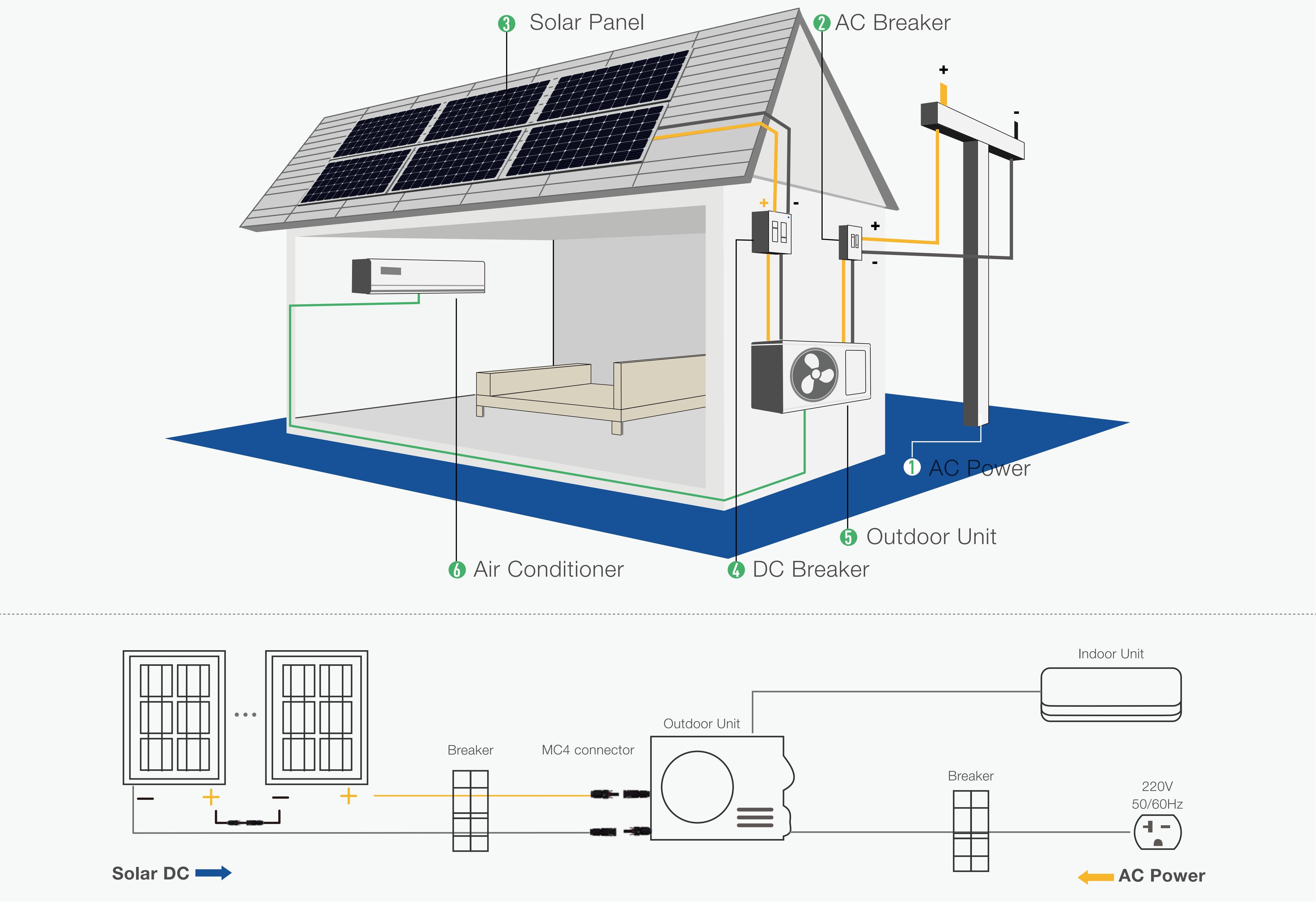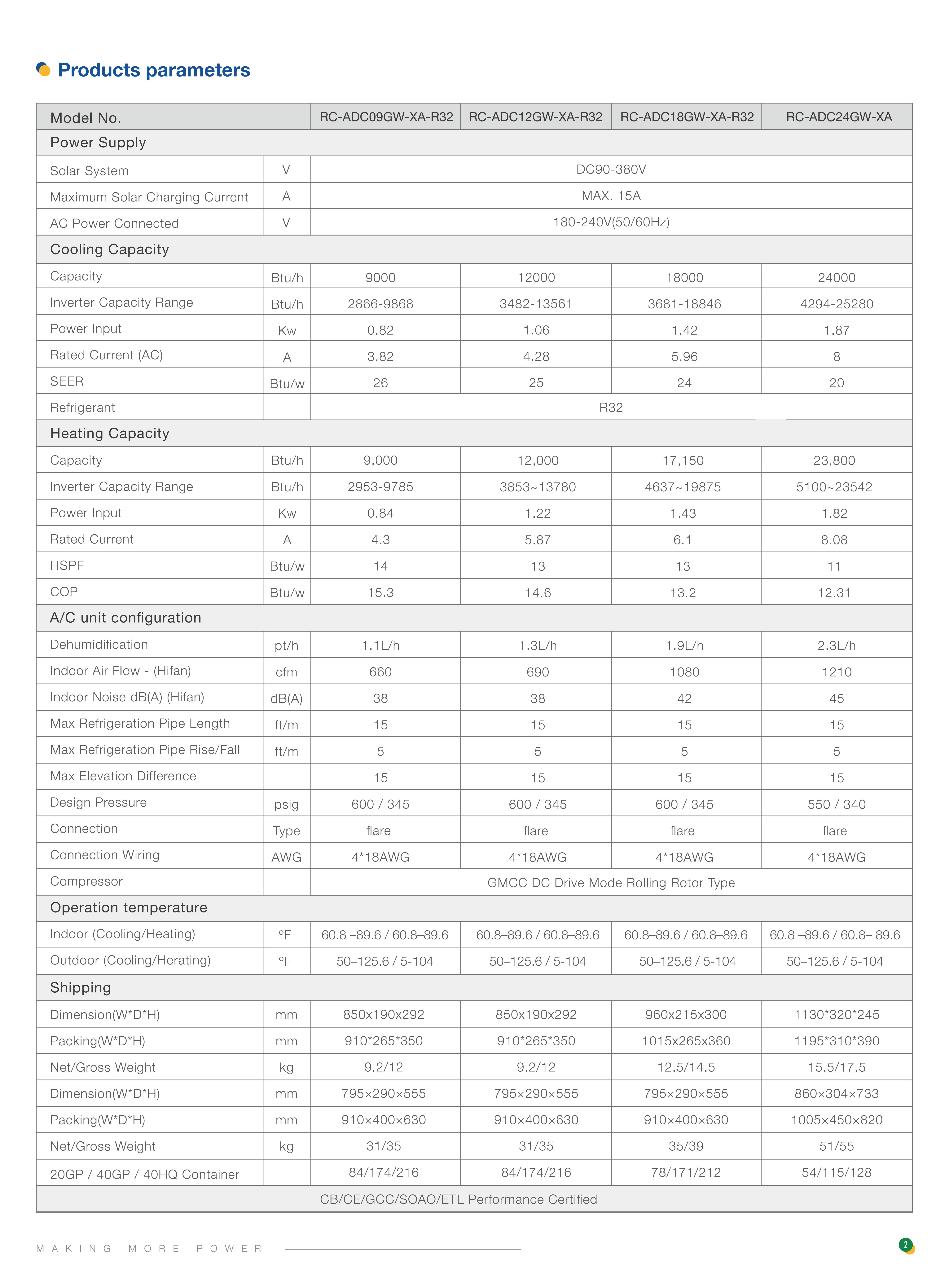The exact size of the global market for solar air conditioners is challenging to determine accurately as data on specific products and regions can vary. Additionally, the market is highly fragmented, with many regional and local manufacturers and suppliers. However, with the increasing focus on renewable energy and energy efficiency, the solar air conditioning market is expected to continue growing in the coming years.
Solar panel voltage:
DC90-380VMaximum Solar Charging Current:
15AAC Power Connected:
180-240V(50/60Hz)Refrigerant:
R32Compressor:
GMCC DC Drive Mode Rolling Rotor TypeConnection:
Flare
Solar air conditioners are air conditioning systems that are powered by solar energy. They use solar panels to capture sunlight and convert it into electricity to operate the air conditioning unit. Solar air conditioners are considered to be more environmentally friendly and energy-efficient compared to traditional air conditioning systems that rely on grid power.
The global market for solar air conditioning has been growing steadily in recent years due to increasing awareness of renewable energy and the need for energy-efficient cooling solutions. The market growth is driven by several factors, including government incentives and policies promoting renewable energy, rising energy costs, and growing concerns about climate change.
However, it's important to note that the market for solar air conditioners is relatively niche compared to the overall air conditioning market. Traditional grid-powered air conditioning systems still dominate the market due to their affordability and widespread availability. The adoption of solar air conditioners is often influenced by factors such as geographic location, solar resource availability, and upfront costs.

The main feature of a solar air conditioner is its ability to harness solar energy to power its cooling process. Unlike traditional air conditioners that rely on electricity from the grid, solar air conditioners utilize solar panels to generate electricity directly from sunlight. Here are some key features of solar air conditioners:
1. Solar Power Generation: Solar air conditioners incorporate solar panels to convert sunlight into electricity. These panels are typically installed on the roof or in an area with ample sunlight exposure.
2. Energy Efficiency: Solar air conditioners are designed to be highly energy-efficient. They often incorporate advanced technologies such as inverter compressors and variable-speed fans to optimize energy consumption.
3. Off-Grid Capability: Solar air conditioners can operate independently of the electric grid, making them suitable for remote locations or areas with unreliable power supply. Excess energy generated during the day can be stored in batteries for use during the night or periods of low sunlight.
4. Reduced Carbon Footprint: By using solar power, these air conditioners significantly reduce carbon emissions associated with electricity generation. They help contribute to a greener and more sustainable environment.
5. Cost Savings: Over time, solar air conditioners can lead to significant cost savings on electricity bills, particularly in regions with ample sunlight. Users can benefit from reduced energy consumption and, in some cases, take advantage of government incentives or net metering programs to further offset costs.
6. Scalability: Solar air conditioning systems can be scaled to meet various cooling needs, from residential buildings to commercial spaces. They are available in different capacities and configurations to accommodate different cooling requirements.
7. Integration with Existing AC Systems: In some cases, solar air conditioners can be integrated with existing conventional AC systems, allowing users to take advantage of solar power while still having a backup power source when needed.
It's important to note that the availability and adoption of solar air conditioners may vary in different regions and markets due to factors such as sunlight exposure, climate conditions, and government policies.

The specific features of a solar air conditioner can vary depending on the manufacturer and model, but here are some common features:
1. Photovoltaic (PV) Panels: Solar air conditioners are equipped with PV panels or solar panels that capture sunlight and convert it into electricity.
2. Energy Efficiency: Solar air conditioners are designed to be highly energy-efficient, which helps reduce electricity consumption and lower operating costs.
3. Hybrid Operation: Some solar air conditioners can operate using both solar power and electricity from the grid. This allows them to function even when sunlight is not sufficient or during nighttime.
4. Inverter Technology: Many solar air conditioners incorporate inverter technology, which enables the compressor to operate at variable speeds. This results in better energy efficiency and more precise temperature control.
5. Energy Monitoring and Management: Some solar air conditioners come with built-in energy monitoring systems that allow users to track their energy usage and optimize performance.
When it comes to different capacity solar air conditioners, the main difference lies in their cooling capacity or the amount of heat they can remove from the indoor space. The cooling capacity of an air conditioner is typically measured in BTUs (British Thermal Units) or tons. A higher capacity air conditioner can cool a larger area or handle a higher cooling load.
Choosing the right capacity depends on factors such as the size of the room or space you want to cool, insulation levels, climate conditions, and the number of occupants. It's essential to select a solar air conditioner with a capacity that matches your cooling needs to ensure optimal performance and energy efficiency.
FAQs:
Q1: Do you support OEM/ODM?
A:Definitely, OEM&ODM service is supported with a certain quantity,including customize logo,package and label;
Q2: What's the production time?
A: The production time is normally 15 working days. but we will always prepare some stocks for popular models.
Q3: Can you provide DDP service?
A:Yes, if you are a personal customer and don't want to deal with the customs, we can provide DDP service to your address.
Q4: What about the warranty and how to claim?
A: Warranty period are 5 years since you receive the product, our professional after-sales team will deal with all warranty issues.